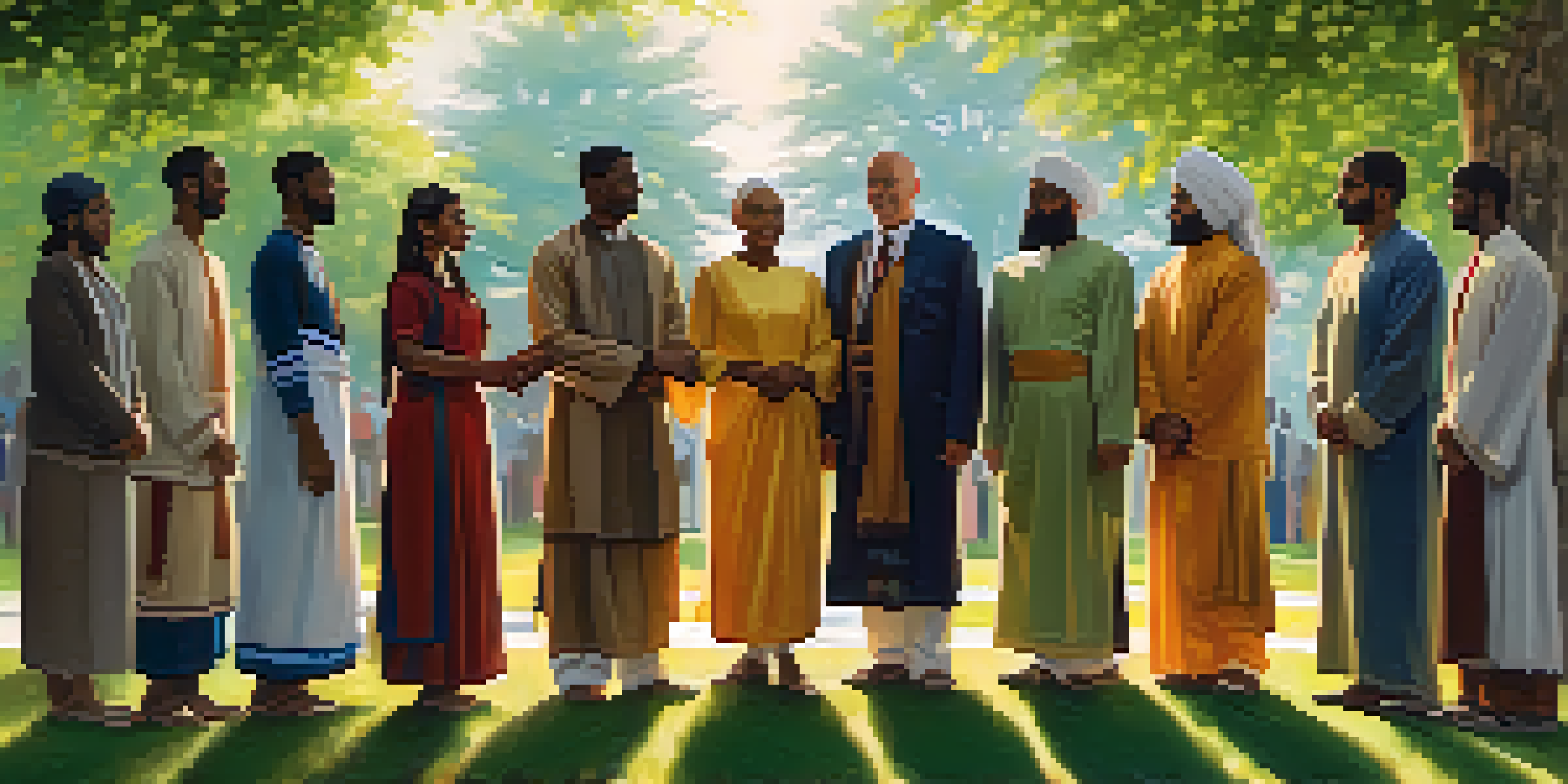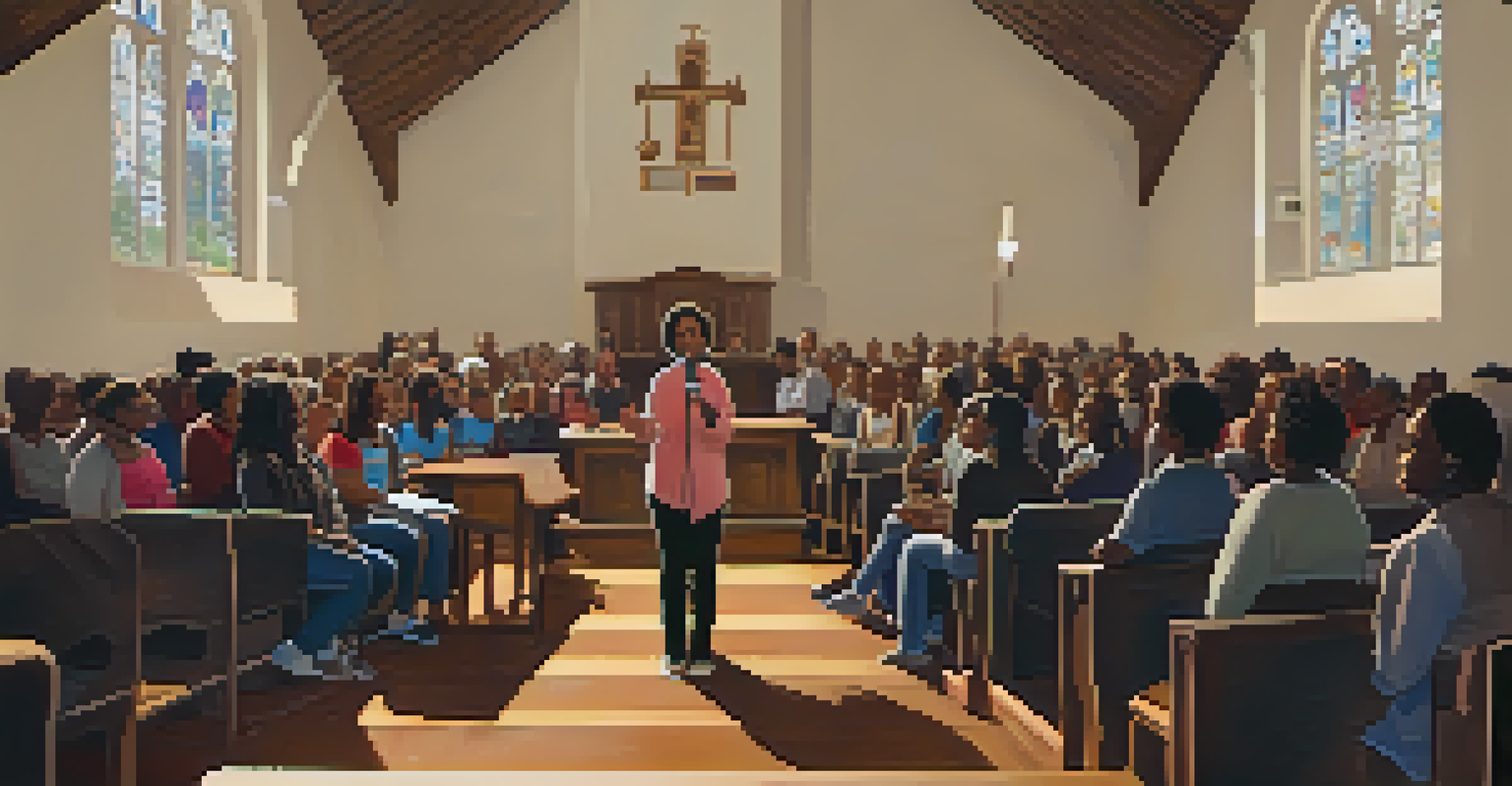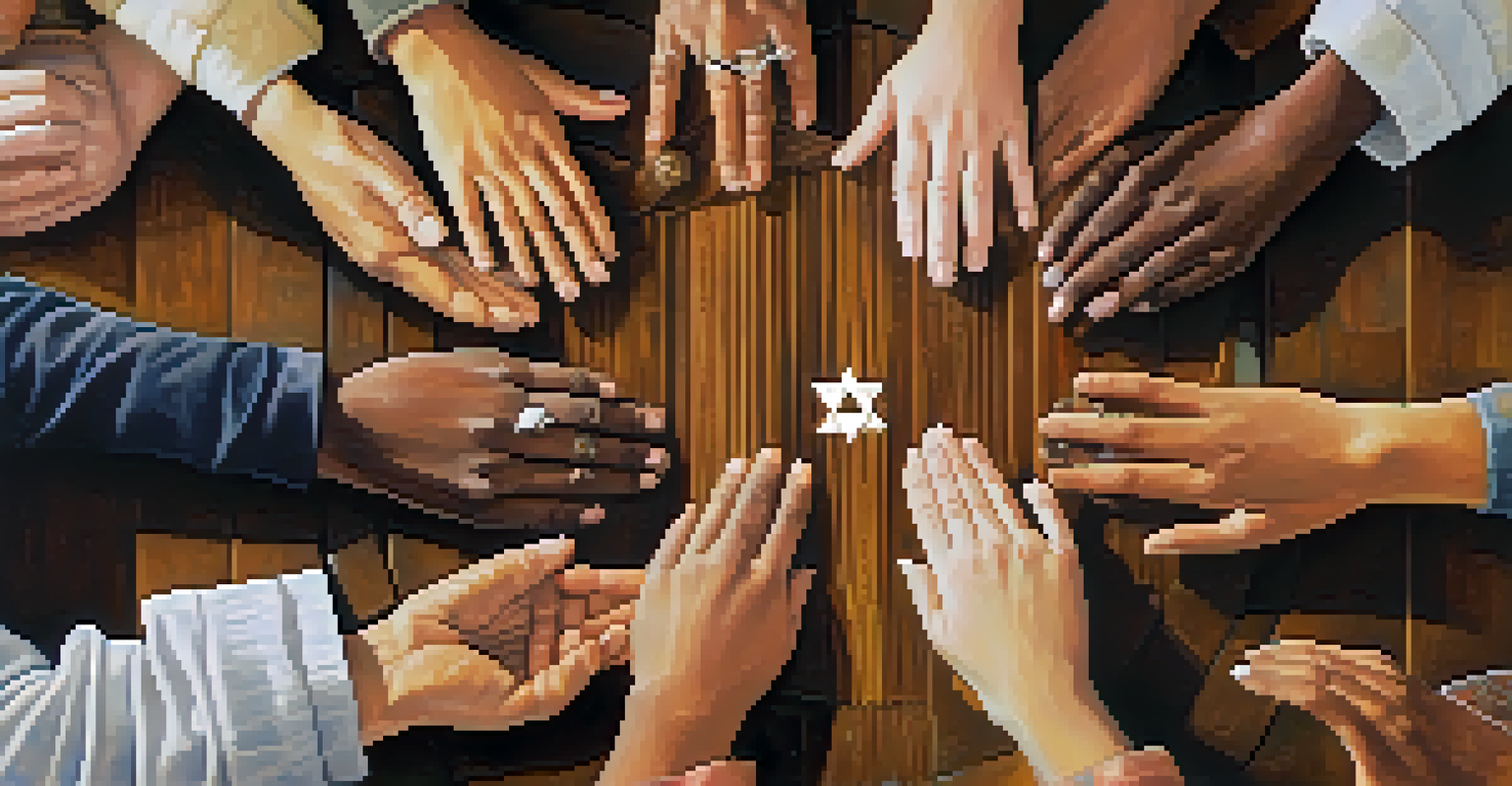The Role of Faith in Driving Social Justice Movements Today

Faith as a Catalyst for Social Change
Faith communities have often been at the forefront of social justice movements, providing a moral framework for change. For many, faith instills a sense of duty to advocate for the marginalized, igniting passion and purpose. This spiritual motivation can galvanize individuals and groups alike, transforming personal beliefs into collective action.
Faith is taking the first step even when you don't see the whole staircase.
Take, for example, the Civil Rights Movement in the United States, where churches served as meeting spaces and moral compasses. Leaders like Martin Luther King Jr. drew on their faith to articulate a vision of justice that resonated widely, emphasizing love and equality. This historical precedent shows how faith can serve as a powerful unifier in the quest for social justice.
Moreover, faith-based organizations often provide resources and networks that bolster activism. These groups can mobilize volunteers, raise funds, and amplify voices that might otherwise go unheard. In this way, faith not only inspires action but also facilitates the practical aspects of driving social change.
Interfaith Collaboration for Justice
In today's increasingly diverse world, interfaith collaboration has emerged as a powerful force in social justice. Different faith traditions often share common values like compassion, justice, and service, which can act as a foundation for collective action. Working together, these groups can tackle issues like poverty, inequality, and discrimination more effectively.

For instance, the interfaith movement has played a significant role in advocating for climate justice. By joining forces, religious leaders from various backgrounds have raised awareness about the moral imperative to protect the planet. Their united front not only amplifies the message but also encourages broader community engagement.
Faith Drives Social Justice Movements
Faith communities provide a moral framework and resources that inspire and mobilize collective action for social justice.
Interfaith collaboration also fosters understanding and tolerance among different religious groups. In a world where division often takes center stage, these partnerships can help bridge gaps, building solidarity and mutual respect. Ultimately, this synergy strengthens social justice movements, creating a richer tapestry of voices advocating for change.
The Power of Faith in Grassroots Activism
Grassroots activism thrives on local engagement and personal connections, and faith often plays a crucial role in this dynamic. Many grassroots movements are rooted in communities where faith serves as a motivating force for action. Individuals inspired by their beliefs often rally together to support causes that matter to them and their neighbors.
We are all called to be a voice for the voiceless, and faith can help us find that voice.
Consider how faith-based organizations have mobilized communities for issues like affordable housing or education reform. They often leverage their networks to organize events, raise funds, and advocate for policy changes. This local focus not only addresses immediate needs but also empowers individuals to take ownership of their communities.
Additionally, the emotional and spiritual support provided by faith can be a stabilizing force for activists. Facing adversity and challenges, these individuals often find solace and strength in their beliefs, helping them to persevere in their fight for justice. This resilience is crucial in sustaining long-term movements.
Spiritual Narratives Shaping Justice Discourse
Narratives rooted in faith can significantly shape the discourse surrounding social justice issues. These stories often highlight the struggles and triumphs of individuals or communities, creating a compelling call to action. When framed within a spiritual context, these narratives resonate deeply with audiences, encouraging empathy and involvement.
For example, many social justice campaigns utilize powerful testimonies that reflect the lived experiences of marginalized groups. By sharing these stories in a faith-based context, advocates can evoke a sense of moral responsibility in their audience. This approach not only informs but also inspires action, as people feel connected to the struggles of others.
Interfaith Collaboration Enhances Activism
Working together across different faith traditions can amplify efforts to address pressing social issues like poverty and climate justice.
Moreover, spiritual narratives can challenge societal norms and injustices. By invoking religious teachings, advocates can question the status quo and call for systemic change. This blend of storytelling and faith creates a potent tool for raising awareness and mobilizing support for social justice.
Challenges Facing Faith-Based Activism
While faith can be a powerful motivator for social justice, there are also challenges that faith-based activists face. One significant hurdle is the perception that religious groups are often tied to specific political ideologies. This can alienate potential allies and limit the scope of collaboration necessary for effective activism.
Additionally, internal divisions within faith communities can create friction. Different interpretations of religious teachings can lead to disagreements about social justice priorities and strategies. Navigating these complexities requires patience and open dialogue to ensure that diverse perspectives are acknowledged and respected.
Lastly, the risk of co-opting faith for political agendas can undermine the integrity of social justice efforts. Activists must remain vigilant to ensure that their actions are genuinely rooted in their beliefs and not merely serving external interests. This balance is crucial for maintaining authenticity and trust within their communities.
Faith and Youth Engagement in Justice Movements
Younger generations are increasingly integrating their faith into their activism, bringing fresh perspectives to social justice movements. Many young people view social justice as a core component of their spiritual beliefs, driving them to engage more actively in advocacy. This generational shift is reshaping how faith communities approach social issues.
For instance, youth-led movements like March for Our Lives or the Sunrise Movement highlight the intersection of faith and activism. These young leaders often draw on their beliefs to advocate for change, emphasizing themes of justice, love, and stewardship. Their enthusiasm and commitment can inspire others to join the cause, creating a ripple effect that extends beyond traditional faith communities.
Youth Shape the Future of Activism
Younger generations are increasingly integrating their faith into activism, bringing fresh perspectives and energy to social justice movements.
Moreover, faith leaders are recognizing the importance of youth engagement, adapting their messages to address contemporary issues. By embracing the voices of young activists, faith communities can ensure their relevance in today's social landscape. This collaboration fosters a new generation of leaders committed to both their faith and social justice.
The Future of Faith in Social Justice Movements
As we look to the future, the role of faith in social justice movements will likely continue to evolve. With the rise of technology and social media, faith-based activism can reach wider audiences than ever before. This digital landscape offers new opportunities for collaboration, storytelling, and mobilization, bridging gaps between different communities.
Moreover, the growing emphasis on intersectionality in social justice is prompting faith groups to broaden their focus. By recognizing the interconnectedness of various social issues, these communities can work together more effectively. This holistic approach enhances the impact of their efforts, creating a more inclusive and equitable society.

Ultimately, the future of faith in social justice lies in the willingness to adapt and collaborate. By embracing diverse perspectives and fostering interfaith dialogue, faith communities can play a pivotal role in addressing the pressing challenges of our time. Together, they can continue to inspire change and advocate for justice in meaningful ways.